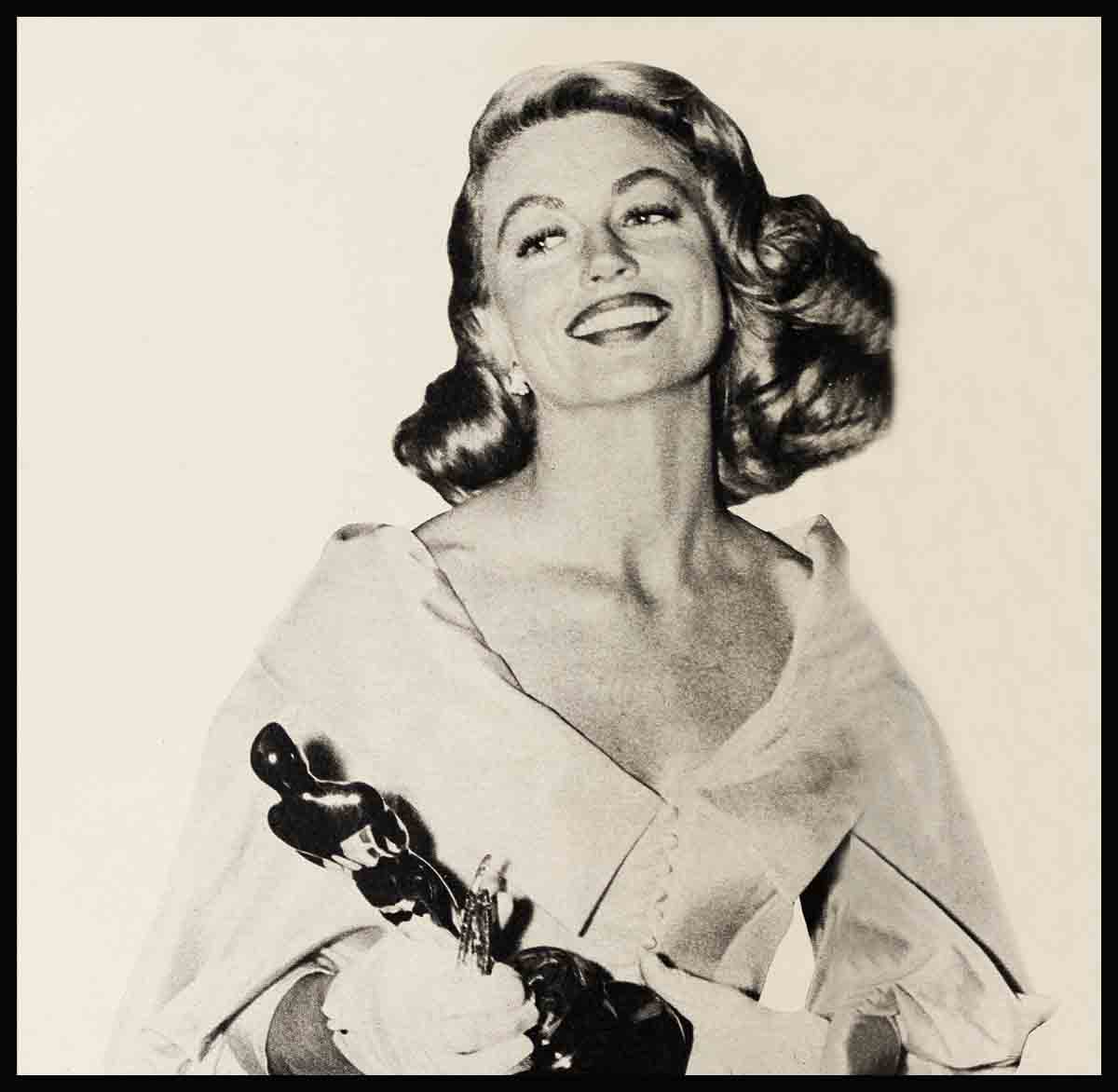
This Is Your Life Dorothy Malone
To you, Dorothy Malone, it seemed like a mile to the stage of the PANTAGES THEATRE. When Jack Lemmon opened the envelope for Best Supporting Actress of 1956 and announced, “The winner—Dorothy Malone!” your legs had suddenly turned to putty. Somehow you made your way down the long aisle as the orchestra struck up “Written On The Wind” and applause thundered. But all you could think of was, “This isn’t for me. It’s for Billy.”
So the first words you blurted into the mike, as the house hushed and the TV cameras moved in, were “I’d like to dedicate this award to my late little brother, Bill.”
Not many who heard you that gala Academy Award night in Hollywood last March understood the strange tribute. You went on to thank everyone who’d helped you in the picture so effusively and so long that Emcee Jerry Lewis fingered his wrist watch nervously, as if you’d never stop. But Dorothy, you had really said it all with your first sentence.
Back in your seat, you felt your brother Bob reach over and clasp your hand. Squeezing his gratefully, you creased your dimples in smiles all around and, at the same time, struggled to keep those green eyes of yours from blurring too much.
But your mind’s eye searched far away—and back—to a golf fairway, the 17th Hole of the DALLAS COUNTRY CLUB, on the highest hill in the city. And to a golden-haired boy of sixteen, taking his stance for a gambling shot to the green. That was Bill.
You weren’t there yourself. At the time you were in Hollywood. But you knew exactly how it happened—to the smallest detail. That day the Dallas sky was as blue as Bill’s eyes, except for a tiny, inconspicuous cloud over Fort Worth way. Bill was playing golf, just set for the swing; lightning struck and he died instantly.
He was eleven years younger than you and more like your son than your brother. He’d arrived as a special family blessing right after both your little sisters had died. You used to cuddle him as a baby and, in your teens, sit with him playing soldiers when your folks went out. People said he looked like you. You liked to take him with you wherever you went—
The show at the PANTAGES went on. Automatically, Dorothy Malone, you laughed at Jerry Lewis’ quips and applauded the winners who followed. But your Oscar lay heavily on your lap, reminding you it was Billy who always rooted you on.
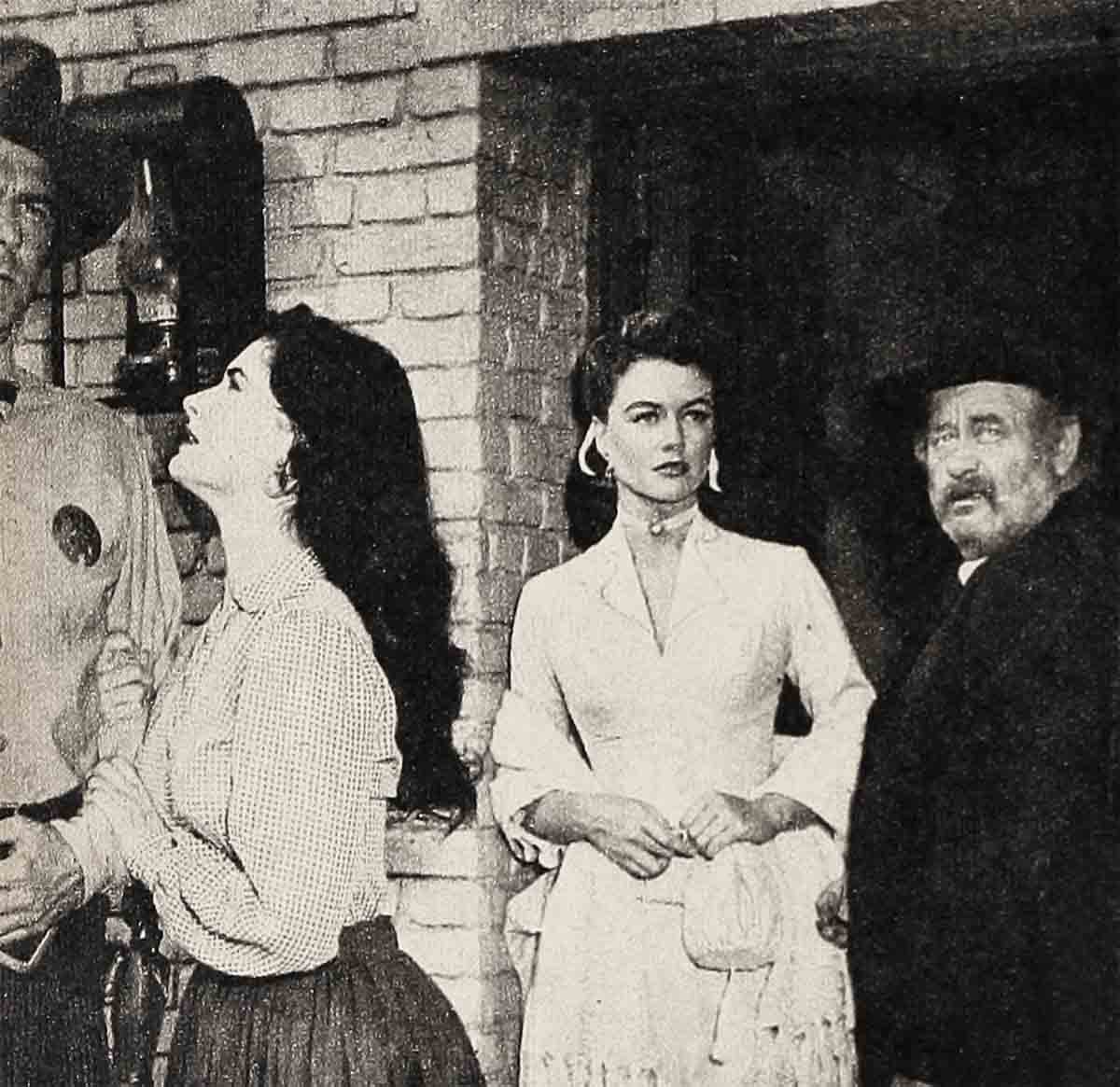
“You’re going great—Dot.”
When the Hollywood offer came and you left college, all your family thought you were foolish. Even Bob, who sat beside you now watching the Awards show. But Bill had always cheered you on. You used to send him your meager press clippings when the first studio going was rough and he’d scrawl back enthusiastically, “Gee, Dot, you’re sure going great!”
The crowds sifted out of the PANTAGES when the last trophy was handed out. Still shaky, you went home with your Oscar and your brother Bob. Bob had been with you that awful August day in 1954 when you got the call from Dallas.
You and Bob were swimming in Bob Stack’s pool. It was nothing unusual for the operator to trace you there. to and from your family in Dallas took place almost daily and you always left word with the exchange where you’d be. But the minute you lifted the receiver you knew this one was different. Your mother was screaming. You caught the chilling words, “. . . Bill. . . . dead!”
You had to tell your brother, and that was agony. You flew home that afternoon. You were in the middle of Young At Heart. After the funeral, the unreal, unbelievable funeral, you had left in desolation and flown back to Hollywood because you had to. The first scene you made, on your return, was the most festive one in the script—where you announced your engagement.
Watching you play it, Frank Sinatra voiced the opinion of everyone on the set. “There’s a girl for you,” he said quietly. “A girl with guts.”
That picture with Frank Sinatra was your first important milestone on a comeback trail, and the comeback was made even tougher by memories.
But—“There’s a pattern in our lives,” you’re convinced, “and everything truly happens for the best.” In the face of the bumps you’ve received you can confidently add, “It always has for me.” Guess that’s one of the reasons your nicknames in high school were Merry Sunshine—and Breathless.
You don’t smoke or drink because any stimulant for you is gilding the lily. From October until May of this year you worked every day except weekends, piling up four still-unreleased pictures. In that time you bought a huge Beverly Hills house with seven bathrooms, and decorated it yourself. You wrote plays and poetry, played golf, rode horseback, swam, painted, sewed, raised two Afghan hounds, dabbled in politics, and—dating the Hollywood field—sometimes danced rock ’n’ roll past midnight. When the career heat cooled, you kited off on charity benefits and resumed your favorite pastime—giving speeches to PTAs, youth organizations, church groups and humane societies.
“I simply adore to make speeches,” you smile a little self-consciously. “Isn’t that ridiculous?”
Well—not so much. Because usually, Dorothy, you have something to say—no matter what happens, life can still be wonderful enough to be worth living to the fullest. At least, that’s the principle you have operated on, just naturally, ever since you were born.
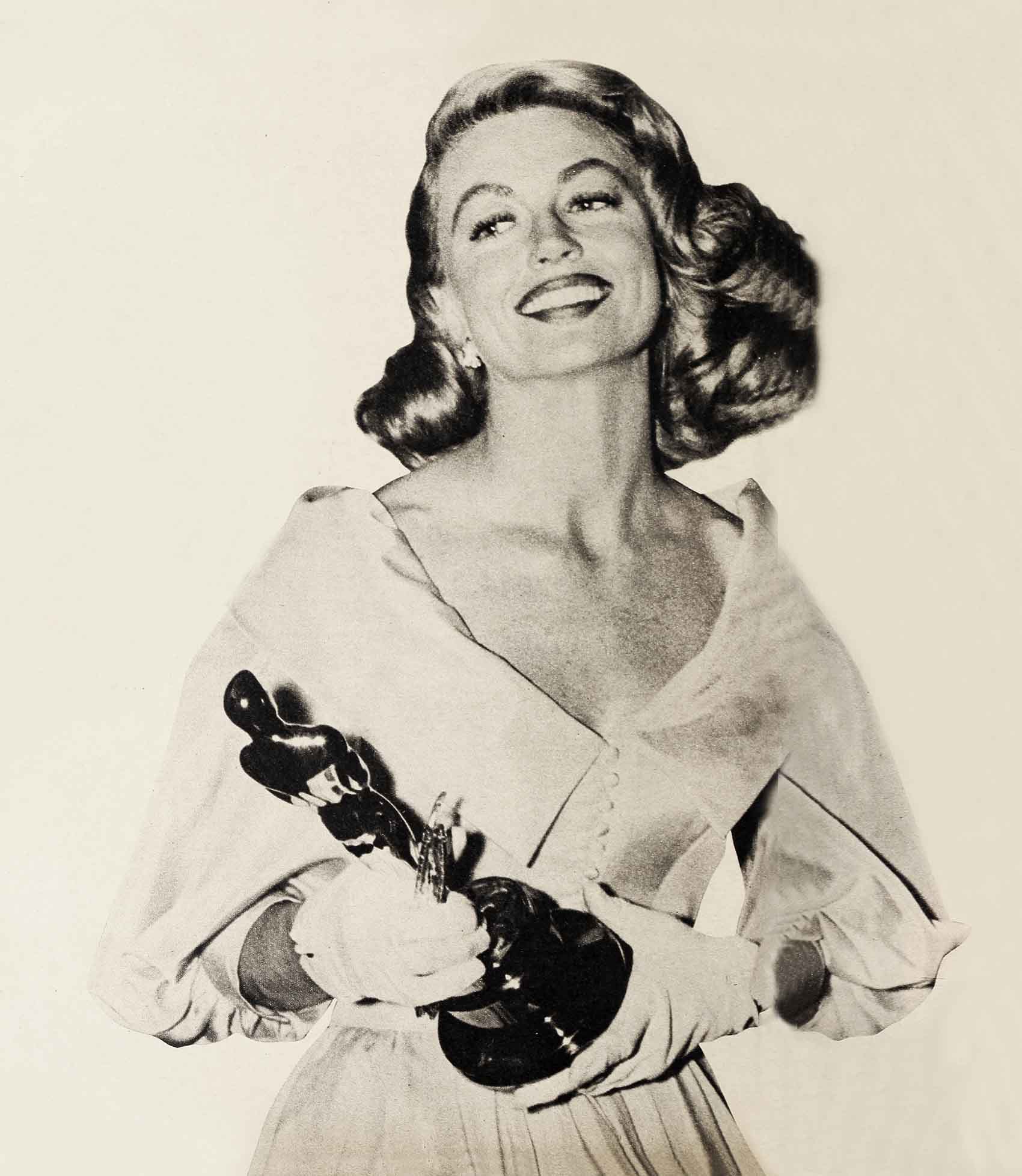
A big family . . . for a while
When your parents, Robert and Esther Maloney, were blessed with a baby girl some twenty-eight years ago last January 30, they called you Dorothy, because the name means Gift of God. That’s what the Maloneys’ first child truly was to them.
You belonged to a happy family, and for a while, a big one—your two little sisters, Patsy and Joanne, two and three years younger than you, and a couple of brothers, Bob and Bill, nine and eleven years younger. For you, Dorothy, the role of big sister was tailor-made. Your sisters and brothers were never tag-along pests to you. Each new baby was your baby.
The day you started school in second grade at URSULINE ACADEMY in Dallas, your chestnut hair was clipped and shaggy from a bout with scarlet fever, your legs and arms were like matchsticks from the weight you’d lost. But your big blue-green eyes sparkled over a toothy grin. It must have been that grin that elected you class president, even though you were a new girl there—a popularity tribute you were to collect every year until you graduated.
Think for yourself
“I loved school,” you often say. “Lessons weren’t work—they were a game.” Maybe that’s why you were so good in all your studies! You’ve said, “That’s the way it is now with my picture parts—a big fun game. Sometimes I think I shouldn’t take the money!”
But even back then, Dorothy, you had a wide streak of “I can think for myself.”
Take your first birthday party. You invited all your URSULINE classmates and, for a special treat, begged your mother to serve chicken-a-la-king, which everybody adored. But the first girl served looked down at her plate dismally and mumbled, “No—thank you.” The awful realization dawned on you, as every other party guest left the chicken untouched: it was Friday! Bravely, sinfully, you ate yours all alone to save your mother’s face. Because in your opinion, the Lord would forgive you under the circumstances.
Actually, Dorothy, you were a good Catholic and still are. Your religious faith has stood more than one test. The first occurred when you were ten years old. That year Patsy and Joanne got polio.
You got the news of their deaths at school. “It didn’t seem real to me at first,” you remember. “I wouldn’t believe it. And then it was suddenly clear: they were with God. I felt content.”
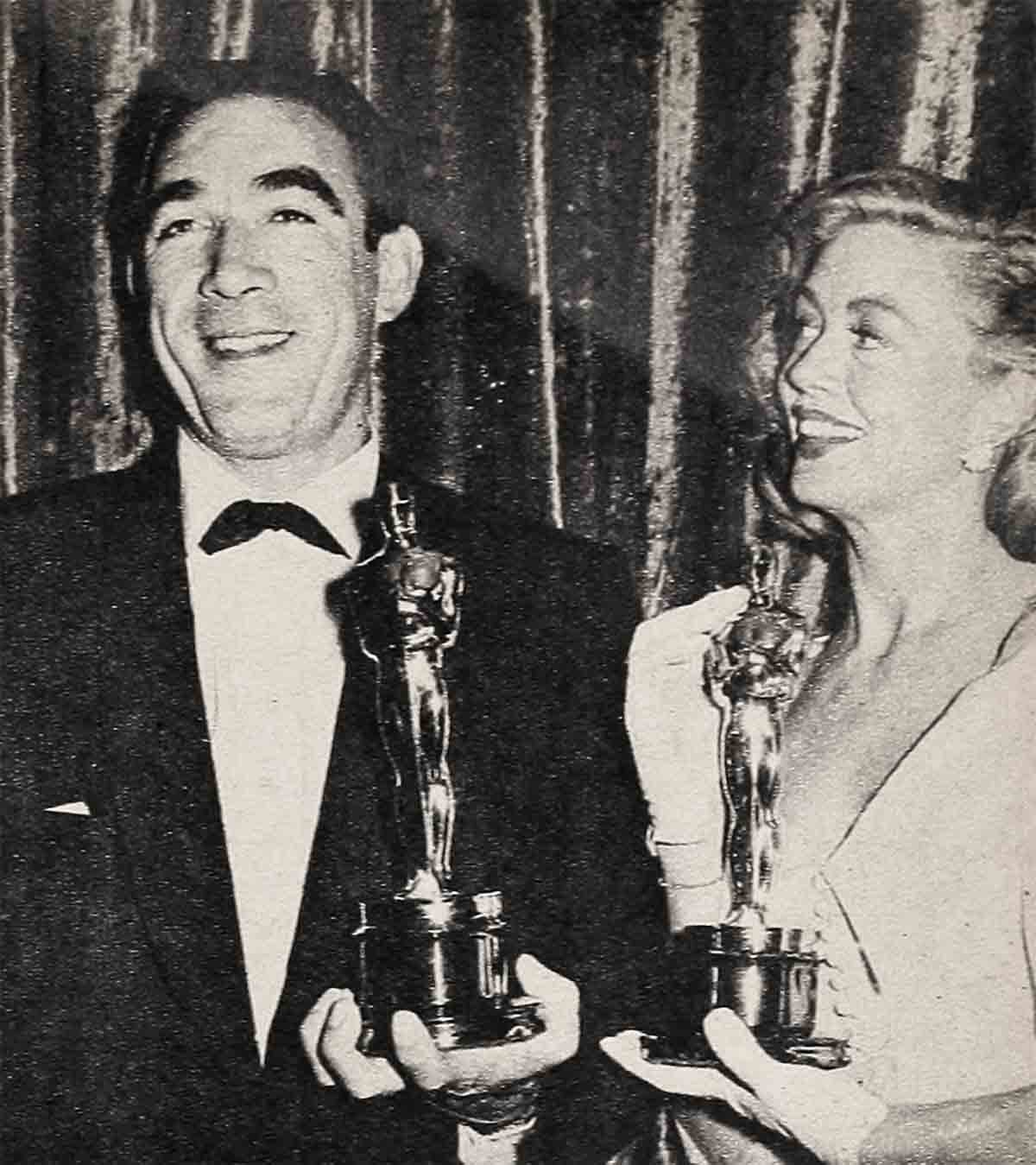
Off to a flying start
Until you graduated from URSULINE ACADEMY at twelve—class salutatorian and a full year ahead of your age group—your world was almost exclusively feminine. After convent classes you took ballet and studied piano and voice with more little girls, or alone. Summers, when you weren’t modelling in kiddie fashion shows at the downtown NIEMAN-MARCUS department store, your family vacationed on a two-acre country place—away from the world. Mostly, you had to play alone. Your baby brothers were much too little.
The switch from this sheltered and exclusively skirted climate to big, co-ed HIGHLAND PARK HIGH might have terrified any other girl. Maybe you were a little scared, too, looking in the mirror at your drab blue serge convent uniform, black ribbed stockings and tam. No lipstick, of course. Already you were gangling—today you measure 5 feet 7 inches—and braces studded your teeth.
But that bubbling personality got you off to a flying start—
On your first day in school, the boy behind you dropped I love you notes so persistently down your blouse that you finally had to slam him over the head with your geography book. During the next four years, besides hitting your studies for a row of A’s, you were Girl Scout leader, Hi-Y representative, president of the Latin Club, and a rangy captain of the girl’s basketball team. You won cups and blue ribbons for diving, swimming and horseback riding. The Student Council named you parliamentarian and head speaker. In your junior year you were elected to the National Honor Society, one of eight chosen from a class of 400—for leadership, scholarship, service and character. You made the debating team and were co-chairman of the Social Service Committee. During your senior year in the Dramatics Club you won first place in Dallas district one-act plays, and, of course, ran off with the lead in the Senior Class play. That year the ROTC elected you queen and, to top it off, the whole student body voted you School Favorite! Along the way you found time to model teenage clothes and tutor English—not to mention keeping a date book stuffed with Dallas dreamboats. In short, Dorothy, you did all right!
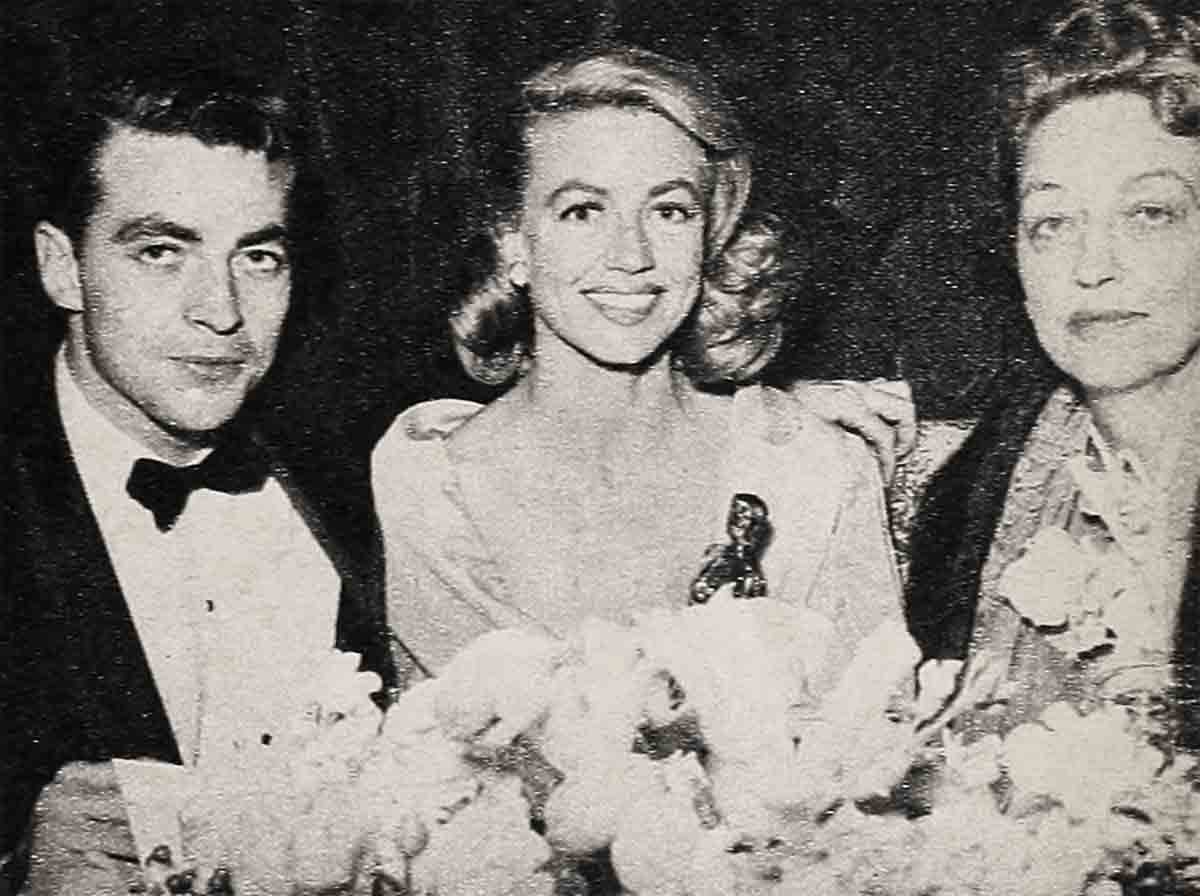
Starbound
When you graduated, three Eastern colleges—including BRYN MAWR—and two Southern Colleges—SWEETBRIAR and a local girls’ college called MISS HOCKADAY’S JUNIOR COLLEGE—offered you scholarships, more or less on the theory that if there was an All-American girl, you were it. You picked MISS HOCKADAY’S. It was in Dallas, and besides, about that time you were pretty bothered about a boy named Buddy who went to SOUTHERN METHODIST U.—and SMU’s in Dallas, too. After a year at HOCKADAY’S—studded as usual with honors—you switched to SMU.
At SMU you concentrated on science and languages. At that point you thought you’d wind up a teacher, or maybe a nurse—something useful. But, of course, meanwhile you got mixed up in campusology. You modelled for college shows, joined more clubs and committees than a congresswoman. One was the Drama Club. They put on a play about the same time you were nominated for SMU’s Beauty Queen. The play’s title couldn’t have been more prophetic—Starbound. You played a girl who lives at the HOLLYWOOD STUDIO CLUB and wins a movie contract. So that’s what you did in no time flat.
An RKO talent scout named Eddie Rubin was really hunting a boy when he came through Dallas. But when he looked at you in Starbound, he wanted you. To you it was just another interesting experience, making a film test. Afterwards. you forgot all about it until one Saturday morning weeks later when a special delivery arrived offering you an RKO contract. “Somebody made a mistake” you muttered and went back to sleep. When you got up you went off shopping with your mother, and the unsigned contract kicked around the house for days without an answer. Pretty soon wires and phone calls bombarded you.
Hanging around RKO
For several weeks you didn’t know what to say. But Bill said “Go!” and in October of 1946, with your mother, you boarded a train for Hollywood.
“I thought that a movie job was like any other job,” you now confess. “I thought you started in a picture with one line, the next picture you had two lines, then three and so on—” But in the three months that you hung around RKO you didn’t say any lines. All you did was study singing, dancing and diction, step out with some Texas boys in town and pose for a few commerical photographers. “But, no calendars,” you laughed.
When your mother finally had to return and rescue her abandoned brood in Dallas, you moved into the HOLLYWOOD STUDIO CLUB, just as that college play foretold. One night, while you were browsing in the library, a woman gasped, “My lord—you’re just the girl I’m looking for!” She wanted you to play a Spanish dancing girl in a club show a week later. During that week you nursed the flu, but you made up a fiery dance to match your temperature and risked pneumonia to do it. Solly Baiano, WARNER BROTHERS’ talent chief, saw you and he knew something that you didn’t—RKO was firing you. He hired you.
A match that didn’t work
At WARNERS you dropped the y from Maloney but picked up five increasingly better parts—until you drew the lead in a big one, One Saturday Afternoon. For you this was the top.
“It was my favorite part in my favorite love story,” you tell us. “I never enjoyed making any picture more.” You also collected swell reviews. After that, RKO offered you a job, MGM two more, and U-I another. That’s when you quit Hollywood and went back home to Dallas to get married.
No one but you, Dorothy, would choose this time to leave Hollywood. But your heart beckoned and, as usual, it ruled. Back you went to Dallas to be married with no thought of ever returning to your career.
“He was an ideal boy and someone I admire to this day,” you confess. But as the wedding date drew nearer, you began to feel for some inexplicable reason you were not for each other. Slowly you realized there was only one course to take. You summoned all your courage and did what you knew in your heart was the right thing. You cancelled the wedding.
Emotionally exhausted from the biggest decision you had ever had to make, you found yourself in Dallas with all your bridges—you figured—burned back in Hollywood.
So you used the fame you’d collected in Hollywood to boost Texas charity, civic and church events. You took a public relations job with an insurance company and toured thirty-six states building goodwill. For that you made less in one month than you used to draw for a week in pictures. That didn’t bother you.
The tour that led back to Hollywood—
One tour took you to New York, and you decided to stay for a while. You took a small apartment with two other girls and enrolled in the AMERICAN THEATRE WING, studying diction—“just to keep busy.” Pretty soon you were landing such top TV shows as Omnibus, the Goodyear Playhouse, and the Kraft Hour. In one slow stretch, you whirled off on a goodwill tour of South America for BRANIFF AIRLINES, making speeches. Then Paramount lured you back to Hollywood with a job in a Martin-Lewis picture. This time it was for keeps.
“I didn’t mind starting all over,” you said. “You get a good look at yourself that way.” The look was sharpened when Bill died. You knew what Billy always wanted you to be—the best. After that tragically interrupted part in Young At Heart, you went back to WARNERS, your old studio, and won the lead in Battle Cry over twenty other top actresses. It was the best thing you’d done yet. They’ve all been good since then, right up to Written On The Wind, your latest picture.
A ranch—for Bill
Between pictures, when you’re not flying somewhere—you’ve already been to England for a Royal Command Performance and all over Europe, both Americas and Mexico—you’re racing your white ’55 Chevvy around the West looking at ranches, because—well—Bill always wanted a ranch, and you long someday to raise horses and dogs yourself. In Beverly Hills you ferret out antiques at auctions and change the decor of every room in your big house almost every hour on the hour. You design your own clothes, too, and usually look like the smart NIEMAN-MARCUS model you once were. Last winter you were all set to fly off to Hawaii and write a play—but a persuasive producer nipped that getaway. The only thing that holds you back from doing twice what you do is a tendency to drop pounds alarmingly when you rev up too much. You usually lose ten a picture, but quickly gain them back.
One thing you’ve never regained is the feeling that vanished when your marriage was blighted before it began. In the five years since, you have never again fallen in love—even dating such Hollywood men as Scott Brady, Richard Egan, Sidney Chaplin, Keith Larsen, and producers Roger Corman and Eddie Grainger, to name a few. You’ve dated swarms of Texas men and New Yorkers, too, who get in touch the minute they come to town. But the special one hasn’t come along yet.
Contact Miss Dorothy Malone
That doesn’t worry you, either; you know you’ll find him.
And typical of you, your idea of marriage is—“I’d like to marry a boy I can help, one who’s really ambitious—not just to be rich or famous, but the kind of boy who’d like to try becoming president of the United States for instance—even if he never made it.”
So, if anyone’s for being president—contact Miss Dorothy Malone. If your dream should ever come true, we can’t imagine a first lady who’d light up the White House with more faith, sunshine, activity and good cheer. Not to mention kids: one of them, it’s a pretty safe bet, will be a handsome, golden-haired boy named Bill. . .
THE END
—BY KIRTLEY BASKETTE
Dorothy can soon be seen in MGM’s Tip On A Dead Jockey and U-I’s Pylon.
It is a quote. MODERN SCREEN MAGAZINE AUGUST 1957




